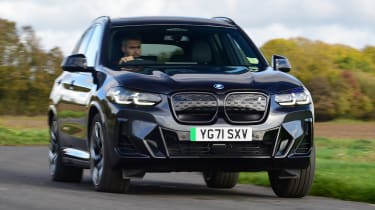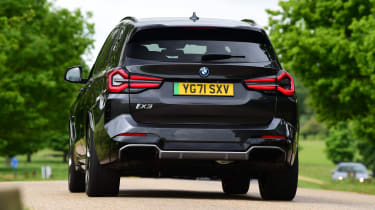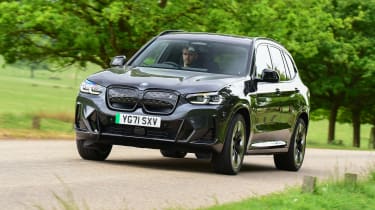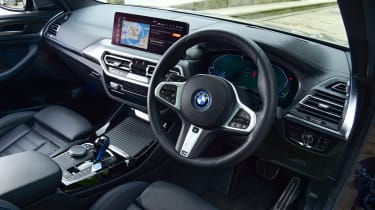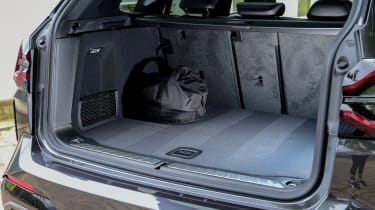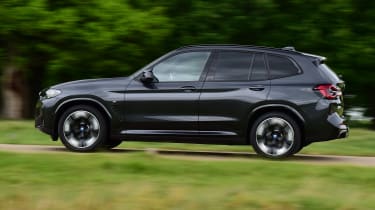BMW iX3 review
Practical, efficient and good to to drive, the BMW iX3 is an all-electric family SUV that exudes quality

Buyers looking to make a seamless shift to all-electric power could well find the BMW iX3 an appealing option. The battery-powered mid-size SUV offers typically solid BMW build quality, superb on-board tech and decent ride comfort, while keen drivers will be pleased to hear that the iX3’s rear-wheel drive set-up trades 4x4 skills for a little more agility and fun on the road.
With plenty of interior space, a usable real-world range and decent rapid-charging capabilities, the iX3 should be able to deal with the rigours of family life with ease, although it does look rather plain next to more stylish rivals, many of which can go substantially further on a single charge.
About the BMW iX3
The BMW X3 family SUV is one of the German manufacturer’s best-selling models, so it seems logical that an all-electric version is now available. The CLAR platform that underpins the X3 was always designed to take a full range of powertrains, from a straightforward combustion engine to mild- and plug-in hybrid set-ups, along with battery-powered drive. So, although it’s not a clean-sheet design like the flagship BMW iX it sits below, the iX3 is by no means a compromised afterthought in the electric mid-size SUV market.
Competition in this area is fierce and growing rapidly. Other established mid-size premium electric SUVs include the Audi Q4 e-tron and Volvo XC40 Recharge , while some of the iX3’s less traditional alternatives include Hyundai Ioniq 5 , Kia EV6 and Genesis GV60 . That said, the iX3’s starting price of nearly £65,000 is significantly higher than any of them. Instead, it’s positioned perilously close to the flagship Audi Q8 e-tron and Jaguar I-Pace . Buyers looking for a very capable family EV on a slightly tighter budget may also have the less expensive Nissan Ariya , Ford Mustang Mach-E and Skoda Enyaq iV on their shortlists. The new BMW iX1 may even steal a few sales away from its big brother.
More reviews
Car group tests
Long-term tests
Road tests
The Tesla Model Y ticks a lot of the same boxes as the iX3 too, offering that little extra badge kudos to go with its practical boot space and roomy cabin, not to mention stonking straight-line performance and superb range. However, thanks to a price reduction in January 2023 , the Model Y significantly undercuts the iX3, starting from under £45,000 while the all-wheel drive Model Y Long Range comes in under £53k.
Unsurprisingly though, the BMW is better built and more refined than the Tesla, and the iX3 looks pretty similar to the regular X3 that was facelifted in 2021, which may appeal to BMW devotees and fans of the marque’s typically understated style.
Buyers get a choice of just two trim levels – M Sport and M Sport Pro – and there is only one powertrain offered for the iX3 consisting of a 80kWh battery (74kWh of which is useable) and single electric motor. That means it foregoes the 4x4 SUV norm and instead sticks with a rear-wheel drive that helps to provide a surprising amount of entertainment for drivers. Sure, it might not be the quickest EV we’ve ever tested, but the iX3 is certainly one of the best handling electric SUVs on sale.
Electric motor, drive and performance
BMW has recognised that most buyers will hardly ever need to rely on the four-wheel-drive capability of their family SUV to get them out of trouble, so in keeping with the driving spirit of the brand, the iX3 is good old fashioned rear-wheel drive. Once behind the wheel it’s clear that this decision has paid off, because the iX3 offers up a truly engaging drive.

Moving through urban traffic is a breeze, with the instant all-electric drive ensuring brisk getaways from junctions and roundabouts, while the throttle response remains smooth at lower speeds and underlines the iX3’s superb refinement. The cabin is free of any excess noise from the electric motor and the suspension set-up does a good job of ironing out bumps. BMW has also engineered a fantastically adaptive and intuitive-to-use recuperation system that allows you to drive using one pedal and helps to top up the battery when driving around town.
While the iX3 is equally composed out on the motorway, it’s on twistier A and B roads where it shows a surprisingly high level of proficiency. A smart turn-in and accurate steering inspires confidence, while body roll is well suppressed – helped by the battery being mounted low along the floor.
0-62mph acceleration and top speed
With 282bhp and 400Nm of torque instantly available from the rear-mounted electric motor, the iX3 manages 0-62mph in 6.8 seconds – not bad when you consider the family EV weighs in at more than two tonnes (heavier than the Hyundai Ioniq 5 or the Volvo XC40 Recharge).
Range, charging and running costs
You’ll need to fork out around £65,000 to buy the most basic iX3 outright, while the more popular route of personal finance will still require pretty hefty monthly payments. The iX3’s official WLTP -rated range of up to 285 miles can’t match that of the Tesla Model Y Long Range (331 miles), Audi Q4 40 e-tron (321 miles) or Volvo XC40 Recharge Twin (312 miles) either. Thankfully, the iX3 has proved itself to be a very efficient machine whenever we’ve tested it.
After covering nearly 7,000 miles in our BMW iX3 long-term test car in M Sport Pro trim, it averaged exactly 3.41 miles per kWh, which is not a number to be sniffed at in a mid-size family SUV like this. We also saw the iX3 return 3.5ml/kWh during our triple test against the Hyundai Ioniq 5 and Volvo XC40 in 2021.
During the mild autumn months when running our iX3 we were seeing 230-240 miles on a charge, but based on our experiences you could see a real-world range close to 260 miles if you make good use of the EcoPro drive mode and strong, intuitive regenerative braking set-up. Unfortunately we didn’t get a chance to see how colder temperatures affect the iX3, but we’d be surprised if the efficiency didn’t drop in winter, though that’s an issue with all electric cars.
When it comes to filling up, the iX3’s 150kW maximum charging speed is about average for this class of EVs, and will allow you to replenish the battery from 10-80 per cent in just 27 minutes – if you use a suitably fast ultra-rapid charger that is. Fully recharging the iX3 from empty will take a smidge under 12 hours if use a standard 7.4kW home wallbox .
Like all electric cars, the iX3 attracts a Benefit-in-Kind (BiK) tax rate of just 2 per cent, compared to the 35 and 12 per cent bands the diesel and plug-in hybrid X3s respectively sit in. So despite it being the most expensive X3 model, the iX3 is by far the cheapest to run as a company car . It's also exempt from road tax (VED) and the London Congestion Charge until 2025.
Insurance
Both iX3 M Sport and M Sport Pro models are in group 44 for insurance, so premiums won’t be cheap, though the Tesla Model Y, and top-spec versions of the Audi Q4 e-tron and Volvo XC40 Recharge, attract similar ratings.
Buyers on a tighter budget may want to look at the Hyundai Ioniq 5, which is cheaper to buy and will be cheaper to insure, because the model range covers groups 29 to 40.
You can get personalised car insurance quotes fast with our comparison tool powered by Quotezone...
Depreciation
BMW models usually benefit from strong residual values and the iX3 continues this trend. Expert data suggests that, over a typical ownership period of three years and 36,000 miles, the all-electric SUV should hold on to around 56 per cent of its original value. This is just ahead of the combustion-engined X3 range, which is expected to retain between 44 and 54 per cent depending on which version you go for.
To get an accurate valuation on a specific model check out our valuation tool...
Interior, design and technology
The BMW iX3 was on sale for less than a year before it received a facelift, taking on the latest design cues of the combustion-engined X3. This includes slimmer headlights, revised bumpers and a much more distinctive tailight arrangement. Aside from the blanked off grille, more aerodynamic wheels and absence of any tailpipes, it’s not easy distinguishing a regular X3 from the iX3.
Yes, the overall iX3 package feels a little plain next to the concept car looks of the Hyundai Ioniq 5 or the distinctive Tesla Model Y, but BMW has clearly decided on an ‘if it ain’t broke, don’t fix it’ approach with its all-electric X3, and everything feels reassuringly solid and of sufficient quality for a £65,000 family SUV. Inside, the iX3 possesses a subtly premium feel with the dash trimmed in Sensatec synthetic leather and Vernasca Leather upholstery for the seats and door cards.
The entry M Sport trim is well equipped and includes 19-inch alloy wheels, adaptive LED headlights, an automatic tailgate, BMW’s Live Cockpit Professional media set-up, Apple CarPlay , Android Auto , three-zone climate control, heated front seats and a wireless charging pad for your smartphone.
If it were our money, we’d probably stick with the regular M Sport spec rather than upgrading to the M Sport Pro edition. Based on our time living with an iX3 in the pricier trim, we don’t think we’d really miss the larger 20-inch rims, head-up display or Harman Kardon audio system, and the only other major addition is High-gloss Shadowline exterior trim.
Sat-nav, stereo and infotainment
The iX3 is one of the last BMWs to use its more traditional infotainment set-up, featuring two separate screens plus tactile buttons for the climate control and other main functions. The very first iX3s featured a 10.25-inch central touchscreen, but thanks to the facelift in 2021 every model is now fitted with a larger 12.3-inch display paired with a digital driver’s display.
The graphics are typically sharp, with few rivals managing to compete with the German brand’s mix of usability, a logical interface and fast loading speeds. BMW offers the choice of touchscreen or physical inputs through its iDrive controller, which is a smart decision. The former is great to use at a standstill – where entering addresses is quick and easy – and the click wheel is great for small tweaks on the move.
The BMW’s digital dials are also clear and easy to read, even though the design is a little fussy. They do at least have plenty of customisation for the driver, including positioning the mapping between the speedometer and power reserve gauge.
Practicality, comfort and boot space
BMW has ensured the iX3 feels suitably premium inside, with high-quality materials and strong build quality, very much like the regular X3. The standard panoramic sunroof means the cabin feels light and airy, while kit such as three-zone climate control, heated front seats and an automatic tailgate add to the comfort and practicality.
Family SUVs need good storage for oddments and the assorted knickknacks that kids insist on bringing with them, particularly when on longer journeys. The iX3 has this covered with large door pockets, a decent-sized glovebox and a useful central tray that houses the wireless phone charger and two cup holders.
Size
Measuring 4,734mm long, 1,891mm wide and standing 1,668mm tall, the iX3 is a little shorter than a Mercedes EQC , but marginally wider and taller. Our 2021 Car of the Year, the Hyundai Ioniq 5, is 99mm shorter and pretty much identical in width, although its bespoke design and clever packaging means it offers more interior space than the iX3.
Leg room, head room & passenger space
The iX3 is a big car and the driver and front passenger will have no problem finding a comfortable position. Headroom is decent, too, while rear occupants benefit from plenty of legroom. You’ll easily get two child seats in the rear, or three adults at a push.
Boot
The combustion-engined BMW X3 has a 550-litre boot, while the plug-in hybrid model has a reduced 450-litre load capacity. The all-electric iX3 sits between the two, offering 510 litres of load space, plus there’s a small storage space under the boot floor for keeping your charge cables out of sight, or to store either the parcel shelf. Pull the levers conveniently located in the boot to fold the rear seat backs and you open up an increased 1,560 litres.
For context, the Audi Q4 e-tron offers 520 litres of boot space with its rear seats in place, expandable up to 1,490 litres. The Tesla Model Y meanwhile trumps them both with an enormous 854-litre boot (loaded up to the roof), an additional 117-litre ‘frunk’ space under the bonnet (something the iX3 lacks) and a van-like 2,041 litres of cargo space when the rear seats are down.
Towing
BMW does offer a towbar for the iX3 as a £935 option, but the all-electric SUV’s maximum towing capacity of 750kg isn’t particularly impressive.
Reliability and safety
Euro NCAP awarded the regular X3 a top five-star safety rating when it was tested in 2017, and has applied the same rating to the fully electric iX3 variant. That’s not surprising though considering it comes with a host of safety features, including BMW’s Attentiveness Assistant system, which can detect driver fatigue, and an Active Driving Assistant that incorporates lane-departure warning and emergency-braking functions.
Other standard kit includes cruise control with a speed limiter, front and rear parking sensors and BMW’s Parking Assistant technology, which can identify a suitable space for your car and park autonomously.
Reliability should be good as BMW has been producing electric cars since 2013 when the i3 city car was introduced, and the iX3 uses the German manufacturer’s fifth-generation eDrive technology also featured in the i4 saloon, i7 limo, and the iX and iX1 SUVs.
